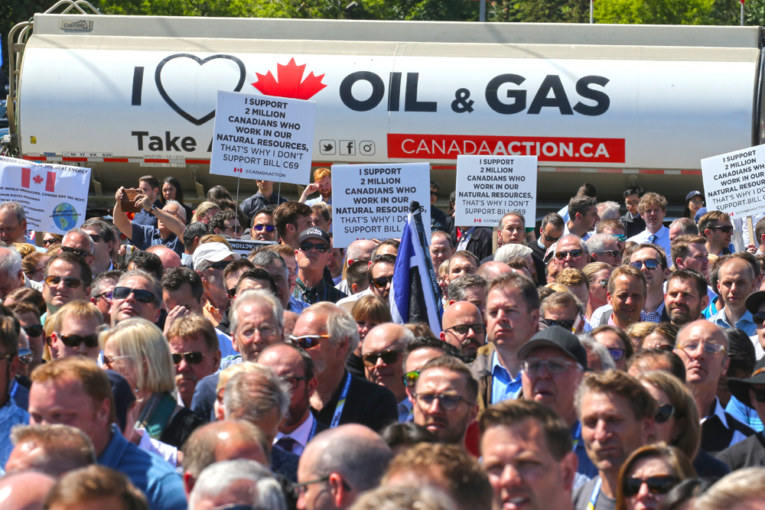
Justin Trudeau is poised to give the green light to a major crude pipeline as he faces rising calls to support Canada’s struggling oil industry.
The prime minister’s cabinet is widely expected to give the go-ahead at a meeting Tuesday to the expansion of the Trans Mountain pipeline from Alberta to Vancouver that would add 590,000 barrels of daily shipping capacity, a 15 per cent boost to Western Canada’s current 4 million. The project would still need to get local building permits, overcome legal challenges and likely face pushback from environmentalists.
The expansion could be the last pipeline to get built under current permitting rules and would go a long way to improve investor sentiment on the Canadian energy sector. The industry’s outlook has grown increasingly gloomy as key conduits get delayed and two environmental bills stir fears that no other project will ever get off the ground. Investment in the oilsands is on track to decline for the fifth straight year as major foreign operators like Royal Dutch Shell Plc and Marathon Oil Corp. left for lower-cost areas.
“Business leaders and people are saying that Canada is not open for business, and that certainly appears to be the case with the new bills coming through,” said Laura Lau, who helps manage about $1.6 billion at Brompton Corp. in Toronto. “Trans Mountain will help, but there will need to be a few other moves as well.”
The industry has already been hit in recent years by the cancellation of TC Energy Corp.’s Energy East pipeline and Trudeau’s rejection of Enbridge Inc.’s proposed Northern Gateway conduit.
Trans Mountain currently represents the sole made-in-Canada option — there are two other pipelines working their way through the U.S. regulatory process — to an industry that has been hamstrung by a lack of shipping capacity weighing on local heavy crude prices and preventing production increases.
Trudeau’s government bought the pipeline last year from Kinder Morgan Inc. in a bid to save its expansion, only to see a court strike down the permit due to lack of consultations. That ruling set out a framework for the current approval by adding additional regulatory requirements and outlining the need for more consultation with indigenous communities.
With a positive decision on Tuesday, the cabinet would ostensibly be certifying that enough has been done to pass legal muster.
The project is crucial for Trudeau politically. His Liberals, heading into elections in October trailing in the polls, have staked much of their legacy on forging a grand bargain on resources. The idea is to be more pro-environment and supportive of indigenous concerns in order to win the “social licence” for development.
Up to now, the approach has mostly fired up opponents on both sides. In Alberta, there is deep anger toward Trudeau’s environmental policies and little trust in the government’s ability to manage the file, with many Albertans openly talking about separation.
Critics have staged somewhat of an open revolt to two environmental bills working their way through Canada’s parliament this week. The most controversial is known as Bill C-69, which creates a new regime for approvals — referred to in Alberta as the “No-More Pipelines” law. The other is a ban on tanker traffic on the northern coast of neighbouring British Columbia. Alberta’s government and the oil sector have actively lobbied to kill or heavily amend the legislation, without success.
Meanwhile, the Trans Mountain expansion could potentially alienate voters in British Columbia, particularly as polls show Trudeau bleeding support to the Green Party.
Legal Challenges
Tuesday’s approval won’t end the legal challenges either. Another judicial review is expected on the latest permit, which will likely be decided on early next year. The government of British Columbia — which opposes the pipeline — is seeking a separate ruling from the Supreme Court on whether it can restrict oil shipments through the province.
There is also work to be done in gaining support from indigenous groups, which the Trudeau government is attempting to do in part by making them stakeholders.
“There is a lot of work ahead of us,” Hal Kvisle, chairman of ARC Resources Ltd., said in an interview on BNN Bloomberg. “The environmental groups will not let this go down easily,” said Kvisle, who is also the former chief executive officer of TransCanada Corp., now known as TC Energy.
The government has said it eventually plans to sell the pipeline, and some combination of First Nations are likely to take a stake in the project along with private buyers such as pension funds.
Even as some indigenous communities in British Columbia have voiced opposition to the pipeline, others are eager to own a stake in Trans Mountain. Project Reconciliation and Iron Coalition, groups formed by First Nations and Metis communities, have arisen to bid on a stake.
The current lack of shipping options sent the industry into a crisis last year, when new production from a few major projects overwhelmed shipping capacity and U.S. refiners had a heavier-than-normal maintenance season. That left Canadian oil with nowhere to go, filling up storage tanks and sending prices to record lows.
The crisis was only alleviated after the Alberta government mandated industry-wide output cuts that took effect this year. The move caused prices to rebound, but has limited how much drillers can produce.
It’s unlikely that the Trans Mountain expansion would come in time to help alleviate the current bottleneck. While construction could begin this year, the project may not come into service until 2022 or 2023.
Bloomberg.com
You can read more of the news on source
